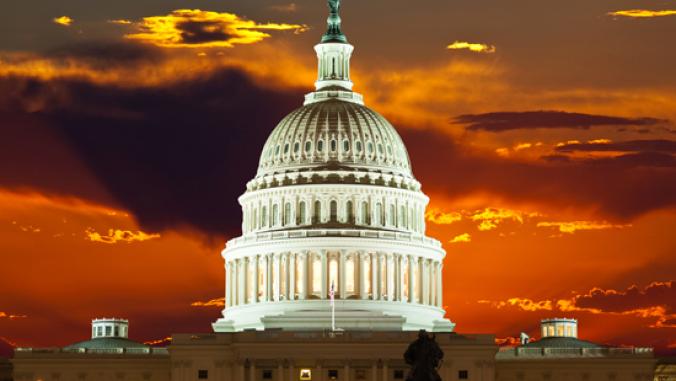Detroit's Big Three Go for Round 2 in D.C.
Seemingly chastened, Big Three execs return to Capitol Hill to discuss an auto industry bailout — and get another frosty reception. Leanne Tobias lays out a green strategy to break the ice and move forward.

When the Big Three visited Capitol Hill for financial relief in November, I took them to task for mismanagement and for decades of fuel inefficiency, but supported their green vehicle initiatives and suggested that the U.S. Congress (or the federal government) not throw the baby out with the bathwater.
The automakers visited Congress again on December 4, and this time they made a more publicly acceptable arrival: They drove straight through from Detroit in fuel-efficient cars and ate boxed lunches en route.
Unfortunately, many members of Congress remained angry and skeptical of Detroit and of bailouts generally, and a Congressional fix is likely to be tough sledding. Richard Shelby, senior Republican on the Senate Banking Committee, stated flatly that he would oppose aid for Detroit, but the unhappiness was bipartisan. Democrats expressed concern about the Big Three's record on fuel efficiency and were concerned that Detroit's troubles were being pinned on labor, despite significant union wage concessions.
Demonstrators attended the December 4 hearings, too, demanding that Congress assist poor families — not poor corporations. Finally, many in Michigan, angered at decades of poor management and outsourcing by the Big Three, take satisfaction at Detroit's troubles — even if it means that conditions throughout the state get tougher.
Yes, there's no shortage of places to point fingers. Detroit's executives and its unions have both made mistakes, as have political figures from both parties. But the economy is hemorrhaging jobs and letting the Big Three go under will improve neither our GDP, our business conditions, our labor statistics, nor the fate of American families. In short, it's too late to point fingers.
Let's consider a pragmatic, bipartisan approach that imposes discipline on Detroit and uses strategies appreciated by both Republicans (tax relief) and Democrats (fiscal stimulus):
o - Short-term, craft a disciplined loan program for Detroit, or a program of preferred equity injections (also a form of debt). The loans should be structured with performance conditions (to ensure accountability in exchange for financial relief) and could be structured with equity kickers, to preserve some ownership rights for the taxpayers.
o - Peg financial assistance to the achievement of environmentally desirable milestones, including fuel efficiency improvements.
o - Consider targeted tax incentives for Detroit's creation of U.S.-based jobs, and consider extending similar incentives to other employers. After all, the end-game is to improve employment and purchasing power by American families.
o - Give Detroit federal contracts for research on energy-efficient vehicles and for the development of green mass transit capabilities. The government had Detroit producing tanks and other military vehicles in World War II — why not turn idle capacity to a desirable public end? There is growing demand for green cars, trucks and mass transit — now is the time for government to prime the pump.
Chris Dodd, chairman of the Senate Banking Committee, has suggested that Congress stay in session until a judicious bailout is crafted. And failing Congressional action, the Fed and the Treasury have the authority to craft a rescue plan — the needs of Detroit are a fraction of what has already been approved for the financial services industry.
I'm with Dodd. It's too late for finger-pointing and going home in a huff.
The automakers visited Congress again on December 4, and this time they made a more publicly acceptable arrival: They drove straight through from Detroit in fuel-efficient cars and ate boxed lunches en route.
Unfortunately, many members of Congress remained angry and skeptical of Detroit and of bailouts generally, and a Congressional fix is likely to be tough sledding. Richard Shelby, senior Republican on the Senate Banking Committee, stated flatly that he would oppose aid for Detroit, but the unhappiness was bipartisan. Democrats expressed concern about the Big Three's record on fuel efficiency and were concerned that Detroit's troubles were being pinned on labor, despite significant union wage concessions.
Demonstrators attended the December 4 hearings, too, demanding that Congress assist poor families — not poor corporations. Finally, many in Michigan, angered at decades of poor management and outsourcing by the Big Three, take satisfaction at Detroit's troubles — even if it means that conditions throughout the state get tougher.
Yes, there's no shortage of places to point fingers. Detroit's executives and its unions have both made mistakes, as have political figures from both parties. But the economy is hemorrhaging jobs and letting the Big Three go under will improve neither our GDP, our business conditions, our labor statistics, nor the fate of American families. In short, it's too late to point fingers.
Let's consider a pragmatic, bipartisan approach that imposes discipline on Detroit and uses strategies appreciated by both Republicans (tax relief) and Democrats (fiscal stimulus):
o - Short-term, craft a disciplined loan program for Detroit, or a program of preferred equity injections (also a form of debt). The loans should be structured with performance conditions (to ensure accountability in exchange for financial relief) and could be structured with equity kickers, to preserve some ownership rights for the taxpayers.
o - Peg financial assistance to the achievement of environmentally desirable milestones, including fuel efficiency improvements.
o - Consider targeted tax incentives for Detroit's creation of U.S.-based jobs, and consider extending similar incentives to other employers. After all, the end-game is to improve employment and purchasing power by American families.
o - Give Detroit federal contracts for research on energy-efficient vehicles and for the development of green mass transit capabilities. The government had Detroit producing tanks and other military vehicles in World War II — why not turn idle capacity to a desirable public end? There is growing demand for green cars, trucks and mass transit — now is the time for government to prime the pump.
Chris Dodd, chairman of the Senate Banking Committee, has suggested that Congress stay in session until a judicious bailout is crafted. And failing Congressional action, the Fed and the Treasury have the authority to craft a rescue plan — the needs of Detroit are a fraction of what has already been approved for the financial services industry.
I'm with Dodd. It's too late for finger-pointing and going home in a huff.





